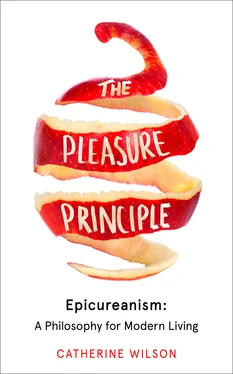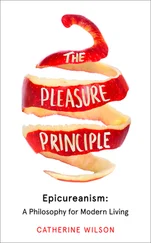In Lucretius’s account, archaic society came to an end with a chance discovery, the discovery of the metals: copper, gold, iron, silver and lead. People observed how, in the immediate aftermath of a forest fire, metals oozed and ran out of rocks and solidified in new shapes. Here was a material that was far harder and more durable than wood and that, unlike stone, could be formed as one wished. Human ingenuity took over, and with metal technology came agricultural slavery, class divisions and brutal conquest. ‘With bronze they tilled the soil, and with bronze they embroiled the billows of war, broadcast wide gaping wounds; and plundered flocks and fields; for everything unarmed and defenceless readily yielded to the armed.’
Contemporary archaeology bears out Lucretius’s view that cities, trade and warfare evolved rapidly with the introduction of metal technology. With the plough and draft animals, human beings could now till vast fields and grow, store and trade grain, the new staple of the diet of the poor. With saws and hammers they could build houses, walls and fences to keep people indoors and livestock segregated. Carts for trade and travel could be furnished with wheels and drawn by domesticated animals. Tools applied to mining brought up precious metals and gems. With the new abundance of food wrested from the soil, populations grew and markets expanded. The art of shipbuilding made long-distance travel possible. A vast gap began to open up between rich and poor. The rich were those who persuaded or forced others to work for them in the fields, to manufacture tools and ornaments, to build dwellings for them and to fight their battles. The poor were those who had no choice but to enslave themselves to the rich.
This process involved gains and losses. Life became safer in some ways, and the countryside was beautified, ‘attractively dotted with sweet fruit trees and enclosed with luxuriant plantations’. Village life remained idyllic, Lucretius thought. People would lie in the grass in friendly company and ‘there would be jokes, talk and peals of pleasant laughter’. Bedecked with garlands of flowers, they amused one another with simple, rather clumsy dances. Singing was a good remedy for insomnia.
At the same time, everything got worse in other respects. Shipbuilding made long-distance warfare possible. Iron spears were far deadlier than Stone Age weapons, and there was now more to fight for. In the cities, the rich began to vie among themselves for wealth and power, and a period of bloodshed and chaos ensued. ‘[T]he situation sank to the lowest dregs of anarchy, with all seeking sovereignty and supremacy for themselves. At length some of them taught the others to create magistracies and established laws … The reason why people were sick and tired of a life of violence was that each individual was prompted by anger to exact vengeance more cruelly than is now allowed by equitable laws.’ If humans had not invented law and bureaucracy, that would have been an end to our species. But they did. Criminality was suppressed, enabling wealthy civilisations to advance further with the building of roads, the erection of palaces and the creation of artworks.
As we now know, ancient artisanship produced objects of utility and beauty for trade and domestic use, but only by making use of slave labour in huge urban workshops. The concentration of settled populations fostered learning in mathematics, astronomy, philosophy and other sciences, as well as the great feats of ancient engineering. It also produced a parasitic upper class that lived from the hard labour of others, enjoying their rents, tax revenues and inheritances, but at the same time gnawed by anxiety over managing and retaining their wealth. Whether rich or poor, Lucretius observed, ‘human beings never cease to labour vainly and fruitlessly, consuming their lives in groundless cares, evidently because they have not learned the proper limit to possession, and the extent to which real pleasure can increase’. Ambition, aggression and corruption render societies that appear externally to be flourishing internally rotten.
There are two especially important features of Epicurean prehistory. First, the Epicurean account invites us to reflect on the nature of power and political authority. Second, Lucretius’s account of the gains and losses of civilisation will resonate with anyone concerned about the effects of technological progress and development on human well-being and the well-being of the rest of life on our planet.
Political authority, in the Epicurean view, does not belong to nature. It exists ‘by convention’. That is to say, there are many forms of government, all of which depend on some form of human acquiescence, and what we define as criminal behaviour and what penalties we impose on lawbreakers are matters of human decision. Rules such as ‘an eye for an eye’ do not constitute natural justice; they rather reflect good or bad decisions about appropriate punishment. Penalties such as a certain number of years in prison for kidnapping, murder or fraud do not fit the crime in any objective sense. They have simply been deemed appropriate by lawmakers, sometimes for no good reason.
The significance of the Epicurean view was considerable. It challenged the prevailing assumption that authority and justice were defined in advance of human decisions and agreement. The Epicurean invites us to distinguish between naked authority – the raw exercise of power : the power to make laws, to establish rules for institutions, to inflict suffering on others, or to reward them with what they value – and legitimate authority , arising out of human agreement.
The original human interpretation of political authority was theological. In archaic and tribal societies, the gods were or are conceived as owning the land and its living beings. They, or subordinate spirits, are imagined to lay down laws concerning permitted and impermissible actions where the rest of nature and other people are concerned. In some tribal societies, divine ownership entailed judicious use of natural resources, especially game, along with other rules for living, strongly or weakly enforced.
In any case, theological accounts of political authority emphasise the power of the gods to punish actions that escape human notice. The Judaeo-Christian-Islamic Bible opens with an account of God’s creative power and his legislative authority. It describes his instructions to the first human pair in his personally owned garden, their disobedience and the terrible consequences of their disobedience. The authority of God’s first prophet Moses, who commands people to leave Egypt and form a new nation, is authority conferred upon him by God. And in Christian political theory, temporal rulers are theorised as placed and held in power by God and as owed a duty of obedience in light of their origin. For the religiously orthodox person, if God didn’t want some particular person to be president of the United States, that person would not be president, so whatever that person does must be consistent with God’s will.
A rival and equally influential tradition regarded political authority as built into the very structure of the universe. Epicurus’s predecessor, the Greek philosopher Aristotle, thought it obvious that the cosmos is hierarchically organised. The superior, he said, always rules the inferior. The heavens rule the earth below them, causing the seasons, which cause weather, which determines the food supply and reproductive behaviour. Many animal species have dominant individuals; masters rule their slaves; men rule women; and women rule children. This is the natural order of things, he maintained, and it would be perverse to question it. His views on natural domination offered one regrettable interpretation of the ancient ideal of ‘life in accord with nature’.
Читать дальше












